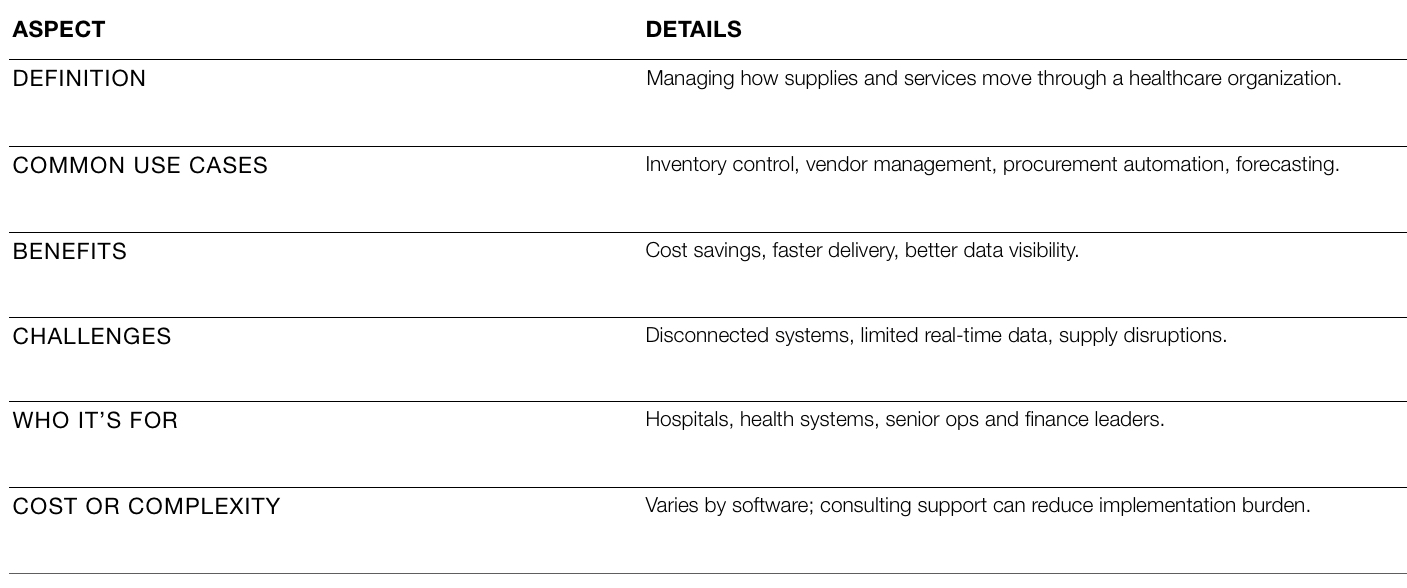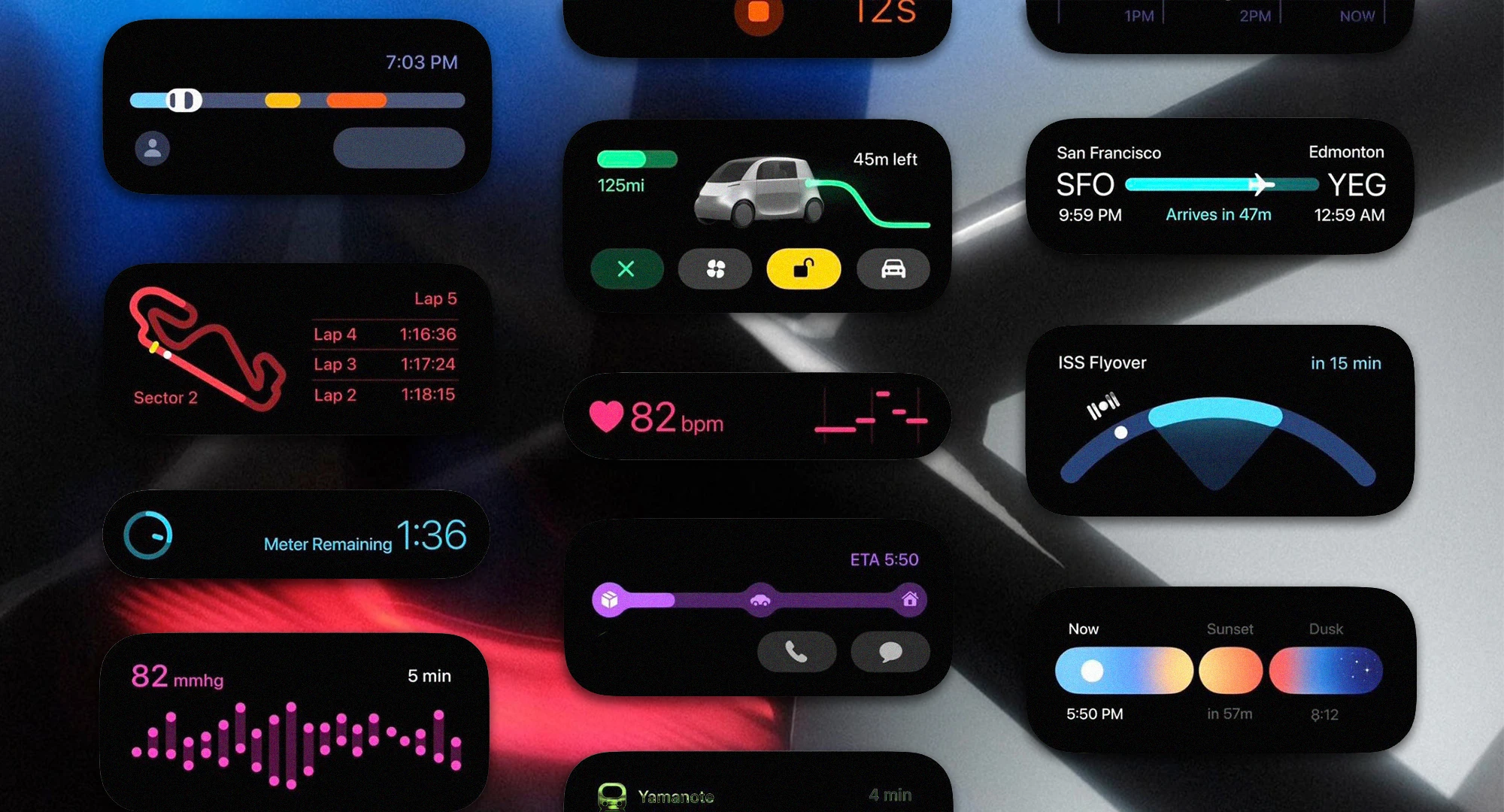
FAQs on Supply Chain Management in Healthcare
Introduction
Enterprise healthcare organizations face increasing pressure to make supply chains more efficient, responsive, and resilient. Outdated systems, fragmented vendor management, and unpredictable demand often disrupt operations, leading to delays in patient care and higher costs. A healthcare strategy consulting firm can play a critical role in navigating these challenges—offering objective insight, customized roadmaps, and implementation support to help organizations modernize operations and align supply chain strategies with broader clinical and financial goals.
This article answers the most frequently asked questions about healthcare supply chain management. It’s designed for Directors, VPs, and senior decision-makers seeking clarity around technology, strategy, and partnerships. You’ll leave with a better understanding of how to improve your supply chain for healthcare performance and where to begin making strategic upgrades.
Market Context: Disruption & Opportunity
The healthcare supply chain is under strain from rising patient volumes, supply shortages, and increasing regulatory scrutiny. Legacy systems and manual processes continue to slow down operations. The industry also faces issues with visibility, where providers often lack real-time insight into inventory, suppliers, and logistics.
At the same time, digital tools, data platforms, and supply chain management software built for healthcare are creating new ways to improve planning and execution. The shift toward value-based care and outcome-driven operations means supply chains must be more agile and data-informed than ever.
This creates a strategic opening for healthcare organizations to modernize their supply chains—using software and consulting partners to reduce waste, increase speed, and improve care delivery.
FAQs Snapshot

What is supply chain management in healthcare?
Supply chain management in healthcare refers to the planning, sourcing, procurement, and delivery of products and services across a healthcare organization. It ensures the right materials are available when and where they are needed—at the right cost. A well-managed healthcare supply chain helps hospitals and providers improve care delivery, cut costs, and reduce risk.
Why is the healthcare supply chain important?
The healthcare supply chain directly affects patient care. Delays, stockouts, or excess inventory can increase risk and cost. A strong healthcare supply chain strategy improves efficiency, reduces waste, and enables faster decision-making. It also helps organizations handle crises like supply disruptions more effectively.
What does healthcare supply chain management software do?
Healthcare supply chain management software helps organizations automate and optimize tasks such as inventory tracking, vendor management, procurement, and demand forecasting. These tools reduce errors, improve visibility, and provide analytics for better planning. Leading platforms also integrate with electronic health records and ERP systems to streamline operations.
What are common challenges in supply chain management in healthcare?
Common challenges include fragmented supplier networks, lack of data visibility, outdated systems, and manual workflows. Many organizations also struggle with aligning supply chain goals to clinical outcomes. As a result, inefficiencies lead to higher costs, delayed treatments, and inventory waste.
How do healthcare supply chain consulting firms help?
Healthcare supply chain consulting firms assess existing workflows, recommend technology solutions, and help build strategies for better efficiency and scalability. They provide industry-specific expertise, guide system integration, and ensure alignment with broader organizational goals. These firms help accelerate transformation and reduce implementation risk.
When should an organization invest in healthcare supply chain software?
An organization should invest in healthcare supply chain software when manual processes lead to inefficiencies, inventory is hard to track, or costs are unpredictable. If real-time visibility or vendor performance is lacking, software can deliver immediate improvements. The right platform also supports growth and compliance needs.
What’s the role of strategy in managing the supply chain for healthcare?
A healthcare supply chain strategy aligns procurement, logistics, and inventory management with clinical and financial goals. It ensures that decisions are data-informed, scalable, and forward-looking. Strategic planning helps healthcare leaders reduce costs, boost service levels, and prepare for operational shifts or emergencies.
Benefits of Healthcare Supply Chain Management Software
Healthcare supply chain management software helps organizations cut costs, improve service delivery, and operate more efficiently. It offers automation, real-time data, and integration across procurement, inventory, and supplier systems.
With the right software, healthcare providers gain better visibility into supply levels and purchasing trends. This reduces stockouts, minimizes over-ordering, and enables accurate forecasting. Integration with clinical systems helps align supply with patient care needs. Dashboards and analytics support smarter decision-making and performance tracking. Overall, healthcare supply chain management software makes supply operations faster, more accurate, and easier to scale.
Quick Summary Table

Let’s kickstart the conversation and design stuff people will love.

Deep-Dive Sections

What It Is & Why It Matters
Healthcare supply chain management is the coordination of people, processes, and tools that ensure the flow of materials, equipment, and supplies in a medical setting. It plays a critical role in reducing cost, improving care, and maintaining operational efficiency. Without proper supply chain management in healthcare, organizations face delays, budget overruns, and compromised patient experiences. A modern strategy makes the system proactive instead of reactive.
How It Works
The healthcare supply chain involves demand planning, supplier sourcing, order fulfillment, logistics, and inventory management. Software platforms automate many of these processes. For example, inventory data is captured in real time and used to trigger purchase orders. Supply chain teams track vendor performance, manage costs, and ensure compliance. Integration with clinical systems supports supply-demand alignment at the point of care.
When to Use It (and When Not To)
Healthcare supply chain systems should be used when an organization needs better visibility, cost control, or efficiency. They are especially useful for large, multi-site health systems. However, if an organization is very small or doesn’t have complex needs, high-end software or consulting services may be excessive. Basic procurement and inventory systems may suffice in those cases.
Tools or Platforms Involved
Popular healthcare supply chain software includes Oracle SCM Cloud, SAP for Healthcare, Workday Supply Chain, and GHX. These tools support automation, analytics, and integration with enterprise resource planning (ERP) or electronic medical records (EMR) systems. Choosing the right platform depends on an organization’s size, complexity, and existing tech stack.
Cost Considerations
Costs vary depending on the scale and features required. Software licensing fees, implementation, integration, and training all contribute to total cost. For enterprise healthcare organizations, investing in supply chain management software can generate savings by reducing waste, improving procurement, and increasing efficiency. Consulting support can help streamline implementation and avoid expensive missteps.
Integration or Setup Requirements
Most healthcare supply chain solutions require integration with ERP, EMR, and vendor systems. Successful setup involves clean data, stakeholder alignment, and IT support. Consulting partners help configure platforms to match workflows and ensure smooth adoption. Integration is critical for gaining the full benefit of real-time data and automation.
Scalability & Flexibility
Scalable systems can handle growth, regulatory changes, and shifting demand. Cloud-based healthcare supply chain management software is designed for flexibility and supports updates without disruption. Modular features allow organizations to expand capabilities over time. This helps supply chain operations adapt to business and care delivery needs.
Trends
Trends in the healthcare supply chain include automation, predictive analytics, AI-powered demand forecasting, and increased focus on resilience. There is also a push for environmental sustainability in procurement. These trends reflect a move toward smarter, more agile operations that support both financial and patient care goals.
Pros and Cons
Pros:
- Improves efficiency and visibility
- Supports cost control
- Enhances decision-making through analytics
- Aligns supply with patient care
Cons:
- Requires up-front investment
- Can be complex to integrate
- Change management and training are needed
How G&Co. Can Help
G&Co. partners with enterprise healthcare organizations to strengthen their supply chain performance through strategic consulting and digital solutions. We have experience guiding brands through software selection, process redesign, and full-scale transformation.
Our team provides practical insight into what works and what doesn’t—from software implementation to long-term strategy. Whether you’re evaluating new platforms or seeking to streamline your current operations, we help you move with clarity and speed. Talk to us to clarify your healthcare supply chain strategy and move forward with confidence.
Conclusion & Next Steps
This article clarified the basics and strategic benefits of supply chain management in healthcare. We explored the role of software, consulting, and strategy in building more efficient, resilient systems.
If you’re ready to take the next step in transforming your healthcare supply chain, G&Co. is here to guide you. We’ve worked with enterprise brands to improve supply chain strategy, technology integration, and operational results. Explore our solutions or schedule a discovery call to begin.






%20(1).png)




